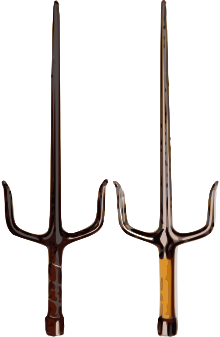
Back ساي (سلاح) Arabic Сай (оръжие) Bulgarian সাই (অস্ত্র) Bengali/Bangla Sai (arma) Catalan Sai Czech Sai Danish Sai German Sai (arma) Spanish Sai (arma) Basque سای (سلاح) Persian

The sai (Japanese: 釵, lit. 'hairpin'; Chinese: 鐵尺, lit. 'iron ruler') is a pointed melee weapon from Okinawa. It was historically utilized in martial arts such as Okinawan kobudō and southern Chinese martial arts, and has been absorbed into the curriculum of many modern martial arts. Although similar weapons can be found in other parts of Asia, the sai is the Okinawan take on the basic concept and should not be confused with the other weapons. The sai is primarily used for stabbing, striking, parrying and disarming opponents. It consists of a pointed metal main prong, that projects from a one-handed handle, two shorter metal side prongs, which project from the opposite sides of the base of the main prong and point in the same direction as it, and a blunt metal pommel fixed to the bottom end of the handle. The sai came to international attention when Okinawan kobudō and karate reached international popularity in the mid-20th Century.